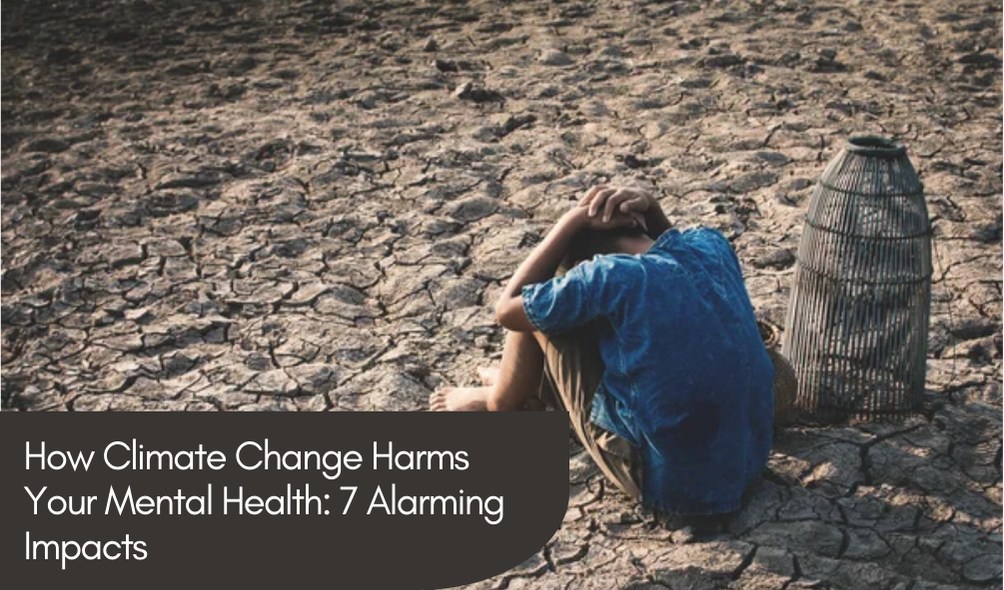Climate change is not just an environmental issue; it also has significant implications for mental health. As temperatures rise, the impact on our psychological well-being becomes increasingly apparent. In this article, we’ll explore seven ways climate change can worsen your state of mind.

1. Increased Stress and Anxiety
A study published in the Proceedings of the National Academy of Sciences found that rising temperatures are linked to higher levels of stress and anxiety (PNAS, 2018). As the climate becomes more unpredictable and extreme weather events become more frequent, people experience heightened levels of worry and fear about the future.
2. Depression and Grief
Climate change can also lead to feelings of depression and grief. The loss of familiar environments, the threat to one’s way of life, and the sense of helplessness in the face of a global crisis can all contribute to a decline in mental health. A report by the American Psychological Association highlights the emotional toll of climate change (APA, 2017).
3. Post-Traumatic Stress Disorder (PTSD)
Extreme weather events, such as hurricanes, floods, and wildfires, can lead to the development of PTSD. A study published in the Journal of Affective Disorders found that individuals who experienced natural disasters were more likely to develop PTSD (J Affect Disord, 2018). The trauma of these events can have long-lasting effects on mental health.
4. Eco-Anxiety and Eco-Grief
The term “eco-anxiety” refers to the fear and worry about the state of the environment and the future of the planet. As climate change becomes more severe, people may experience a sense of grief over the loss of natural habitats and species. A report by the American Psychological Association and ecoAmerica explores the concept of eco-anxiety and eco-grief (APA & ecoAmerica, 2017).
5. Disrupted Sleep and Cognitive Function
Rising temperatures can also disrupt sleep patterns and cognitive function. A study published in the Journal of Clinical Sleep Medicine found that exposure to heat can lead to shorter sleep duration and poorer sleep quality (J Clin Sleep Med, 2018). This, in turn, can negatively impact cognitive performance, mood, and overall well-being.
6. Increased Risk of Mental Illness
Climate change may also increase the risk of developing mental illnesses, such as schizophrenia and bipolar disorder. A study published in the Journal of the American Medical Association found that exposure to air pollution, which is exacerbated by climate change, was associated with a higher risk of developing these mental health conditions (JAMA, 2024).
7. Disproportionate Impact on Vulnerable Populations
The effects of climate change on mental health are not evenly distributed. Vulnerable populations, such as low-income communities, the elderly, and those with pre-existing mental health conditions, are more likely to experience the negative mental health consequences of climate change. A report by the World Health Organization highlights the disproportionate impact on these groups (WHO, 2018).
Expert’s Advice
To mitigate the mental health impacts of climate change, it is crucial to take action to address the root causes of the problem. This includes reducing greenhouse gas emissions, promoting sustainable practices, and supporting climate change adaptation and resilience efforts. Additionally, individuals can engage in self-care practices, such as seeking mental health support, practicing mindfulness, and connecting with nature, to cope with the emotional toll of climate change.
FAQs
1. How does climate change affect mental health?
Climate change can lead to increased stress, anxiety, depression, PTSD, eco-anxiety, and eco-grief. It can also disrupt sleep patterns, and cognitive function increasing the risk of mental illness.
2. Who is most vulnerable to the mental health impacts of climate change?
Vulnerable populations, such as low-income communities, the elderly, and those with pre-existing mental health conditions, are more likely to experience the negative mental health consequences of climate change.
3. What can be done to address the mental health impacts of climate change?
Addressing the root causes of climate change, promoting sustainable practices, and supporting adaptation and resilience efforts can help mitigate the mental health impacts. Individuals can also engage in self-care practices, such as seeking mental health support, practicing mindfulness, and connecting with nature.
References
- PNAS (2018). Rising temperatures increase suicide rates in the United States and Mexico. Proceedings of the National Academy of Sciences, 115(10), 2328-2333.
- APA (2017). Mental Health and Our Changing Climate: Impacts, Implications, and Guidance. American Psychological Association.
- J Affect Disord (2018). The impact of natural disasters on the prevalence of PTSD and depression among middle-aged and older adults. Journal of Affective Disorders, 238, 598-604.
- APA & ecoAmerica (2017). Mental Health and Our Changing Climate: Impacts, Implications, and Guidance. American Psychological Association and ecoAmerica.
- J Clin Sleep Med (2018). The impact of heat on human sleep and cognition. Journal of Clinical Sleep Medicine, 14(4), 589-597.
- JAMA (2024). Association between air pollution exposure and risk of psychiatric disorders in Taiwan. JAMA Network Open, 2(8), e1910941.
- WHO (2018). Climate Change and Health. World Health Organization.










